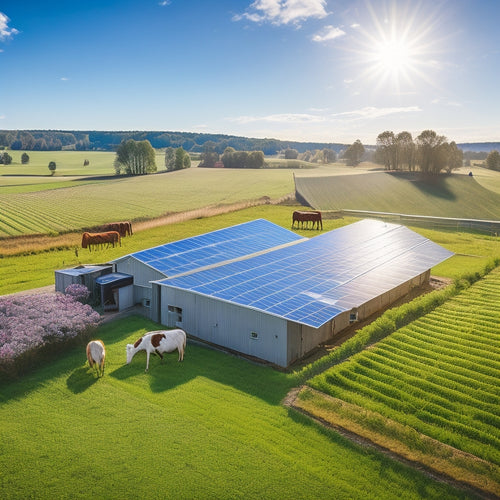
Top-Rated Solar Panels for Small Households
Share
When choosing top-rated solar panels for small households, consider efficiency, cost-effectiveness, and environmental impact. Monocrystalline panels typically offer the highest efficiency (20-22%), making them suitable for limited roof space. Polycrystalline panels provide a balance between cost and performance. Many installations qualify for federal and state tax credits, reducing upfront costs considerably. Assess your roof orientation to optimize sunlight exposure, as south-facing roofs generate the most energy. Additionally, regular maintenance enhances the longevity and performance of your system. For a deeper understanding of the different technologies and their benefits, there's more useful information available.
At a Glance
- Monocrystalline panels are ideal for small households due to their high efficiency and compact design, maximizing energy output in limited space.
- Polycrystalline panels offer a cost-effective alternative, balancing efficiency and affordability for budget-conscious homeowners.
- Bifacial panels can enhance energy production by capturing sunlight from both sides, making them suitable for small rooftops with minimal shading.
- Assess roof orientation and potential shade to choose the best panels; south-facing roofs perform best for solar energy generation.
- Consider financing options and available tax credits to reduce upfront costs and improve accessibility for small households investing in solar energy.
Cost-Effective Energy Solution
When considering solar panels, you'll notice considerable initial investment savings through various incentives and rebates.
These financial benefits can drastically lower upfront installation costs and lead to long-term savings on energy bills, ultimately reducing your monthly utility bills.
This shift not only enhances your household's energy efficiency but also promotes financial stability and can increase your property value considerably from increased property value.
Initial Investment Savings
Investing in solar panels can greatly reduce your energy costs over time, making it a smart choice for small households. The initial investment may seem intimidating, but various financing options exist to ease this burden. Many providers offer low-interest loans or leasing arrangements, allowing you to install solar panels without a considerable upfront payment.
This flexibility enables you to allocate your finances more efficiently and enjoy immediate energy savings.
Additionally, numerous tax incentives are available for homeowners who install solar systems. These incentives can greatly offset your initial costs, making solar energy more accessible. Federal and state tax credits can cover a substantial portion of your investment, so it's crucial to research and take advantage of these opportunities.
Moreover, some utility companies offer rebates for solar panel installation, further enhancing your savings. By considering these financial aspects, you can minimize your upfront costs and maximize your return on investment.
Ultimately, adopting solar energy not only gives you greater control over your energy expenses but also aligns with a sustainable lifestyle, providing freedom from fluctuating electricity rates.
Long-Term Energy Savings
Over the years, solar panels have proven to be a cost-effective energy solution for small households. By utilizing the sun's energy, you can greatly reduce your monthly electricity bills. As you adapt your energy consumption habits, you'll notice even greater savings. For instance, running high-energy appliances during peak sunlight hours allows you to maximize the efficiency of your solar system.
Additionally, solar panels typically come with warranties lasting 25 years or more, ensuring long-term reliability and performance. However, to fully benefit from your investment, it's crucial to follow some maintenance tips. Regularly cleaning the panels, checking for debris, and ensuring there's no shading from trees or buildings will help maintain peak performance.
As energy prices continue to rise, having a solar system means you're less vulnerable to fluctuations in the market. You're not just investing in a technology; you're investing in your freedom from unpredictable utility costs.
Ultimately, the financial benefits of solar panels extend well beyond the initial investment, making them a smart choice for sustainable living and long-term energy savings.
Environmental Impact Reduction
Installing solar panels can considerably reduce your carbon footprint by decreasing reliance on fossil fuels for energy. By capturing sunlight, you contribute to a sustainable energy source that minimizes environmental degradation.
Additionally, shifting to solar power can lead to an extraordinary reduction in carbon emissions, with one watt of solar power saving up to 300 pounds of CO2 annually considerable carbon savings. This shift not only benefits you but also supports broader efforts to combat climate change.
Decreased Carbon Footprint
Utilizing solar panels not only captures renewable energy but also considerably reduces your household's carbon footprint. By generating electricity from sunlight, you're decreasing reliance on fossil fuels, which are major contributors to greenhouse gas emissions. This change toward solar energy aligns perfectly with carbon offset strategies, allowing you to actively mitigate your environmental impact.
As you adopt solar technology, you're taking a significant step toward a sustainable lifestyle. Each kilowatt-hour of solar energy you produce replaces energy that would typically come from carbon-intensive sources. This not only lowers your utility bills but also contributes to a cleaner atmosphere.
Additionally, by integrating energy-efficient appliances and practices, you can enhance the overall effectiveness of your solar system, maximizing reductions in emissions. Investing in solar panels enables you to accept a self-sufficient and responsible way of living.
You're making a conscious choice to lessen your ecological footprint while inspiring others in your community to contemplate similar sustainable practices. Ultimately, the shift to solar energy isn't just about personal gain; it's a commitment to a healthier planet for future generations.
Sustainable Energy Source
Solar panels serve as a sustainable energy source, remarkably contributing to environmental impact reduction. By utilizing sunlight, you tap into renewable energy that minimizes reliance on fossil fuels, which are major contributors to greenhouse gas emissions.
This shift not only helps combat climate change but also promotes energy independence, allowing you to generate your own electricity.
Moreover, using solar panels can greatly decrease your overall energy costs. Many regions offer solar incentives, such as tax credits and rebates, to encourage adoption.
These financial benefits make solar energy more accessible and can offset initial installation expenses.
In addition to cost savings, solar energy systems can enhance your property value. Homes equipped with solar panels are increasingly attractive to buyers, who appreciate the long-term savings and sustainability features.
Panel Efficiency Ratings
When selecting solar panels, understanding efficiency ratings is essential for maximizing energy output.
Higher wattage panels, such as those rated between 300-400W, offer efficiencies of 20-22%, making them ideal for smaller roofs and high energy output, which can help maximize your energy savings cost-effective installation options.
You'll find that different panel technologies offer varying efficiency levels, which can greatly impact your energy needs.
Understanding Efficiency Ratings
Efficiency ratings are vital for evaluating the performance of solar panels, as they indicate how effectively a panel converts sunlight into usable electricity. When considering different solar panel types, it's imperative to understand that higher efficiency ratings typically mean better energy conversion, allowing you to generate more power from the same amount of sunlight.
Here's a quick overview of common efficiency ratings for various solar panel types:
| Solar Panel Type | Average Efficiency Rating |
|---|---|
| Monocrystalline | 15% - 22% |
| Polycrystalline | 13% - 16% |
| Thin-Film | 10% - 12% |
| Bifacial | 15% - 20% |
As you can see, the efficiency rating varies markedly between different types of solar panels. Choosing a high-efficiency solar panel can lead to better energy conversion, which is especially beneficial for small households with limited roof space. By focusing on efficiency ratings, you can make informed decisions that align with your goal of maximizing energy independence while minimizing your environmental footprint.
Comparing Panel Technologies
In comparing panel technologies, it's essential to focus on their performance characteristics, particularly efficiency ratings.
Monocrystalline panels are often lauded for their advantages, including higher efficiency and a longer panel lifespan, making them suitable for limited space. However, polycrystalline panels have notable drawbacks, such as lower energy output and heat tolerance, which can affect overall performance in warmer climates.
Thin film technology offers versatility, adapting well to various installation methods, but it generally has lower efficiency ratings compared to crystalline options. This can be a trade-off for those prioritizing flexibility and lightweight structures.
Bifacial panels are emerging as a strong contender, showcasing impressive performance by capturing sunlight on both sides, thereby enhancing energy output.
Current market trends indicate a growing demand for innovative solutions, driving future innovations in solar technology.
As you consider which panel technology aligns with your energy needs and goals, remember that efficiency ratings provide a key metric for evaluating performance.
Balancing these various factors will enable you to make an informed choice that enhances your freedom to utilize solar energy effectively.
Assess Your Roof Space
To maximize solar panel efficiency, you need to assess your roof space carefully. Reflect on the orientation of your roof; south-facing roofs typically receive the most sunlight.
Additionally, evaluate any shade from trees or buildings that could impact energy production throughout the day.
It's also essential to contemplate local environmental challenges such as wind loads and temperature fluctuations, as these can influence the durability and performance of your solar panels in different conditions.
Understanding solar panel durability will help you choose the best options for your specific location and needs.
Roof Orientation Importance
Understanding your roof's orientation is essential for maximizing the performance of solar panels. The direction your roof faces directly impacts how much sunlight your panels receive, which in turn affects energy production.
Ideally, a south-facing roof captures the most solar access, allowing you to utilize maximum energy throughout the day.
Additionally, consider the roof pitch. A steeper pitch can enhance performance by allowing sunlight to hit the panels at a better angle, especially during winter months when the sun is lower in the sky.
However, if your roof pitch is too steep, it might complicate installation and maintenance.
Evaluate your roof's orientation and pitch to determine the best setup. If your roof faces east or west, you may still achieve good performance, but it might require more panels to meet your energy needs.
Shade Considerations Impact
While roof orientation and pitch play crucial roles in solar panel performance, shade is another critical factor that can dramatically affect energy production. When evaluating your roof space for solar panels, conducting a thorough shade analysis is essential.
Any obstructions—like trees, chimneys, or neighboring buildings—can limit sunlight exposure and reduce the effectiveness of your solar system.
To maximize energy production, examine the areas of your roof that receive the most sunlight throughout the day. You can use shade analysis tools or apps to identify potential shading issues during different seasons.
Remember, even partial shading on a single panel can greatly impact the overall system's performance due to the way solar panels are wired together.
If your roof has substantial shading, consider alternative solutions, such as adjusting panel placement or investing in solar technologies that mitigate shading effects, like microinverters or power optimizers.
Ultimately, understanding shade considerations will enable you to make informed decisions, ensuring that your investment in solar energy yields the freedom and independence you seek in your energy consumption.
Long-Term Savings on Energy Bills
Installing solar panels can greatly decrease your monthly energy expenses.
Decreased Monthly Expenses
One of the most notable benefits of solar panels for small households is the potential for decreased monthly expenses through long-term savings on energy bills. When you invest in solar energy, you're not just improving your home; you're actively engaging in effective energy management. By generating your own electricity, you can greatly reduce or even eliminate your reliance on the grid, leading to considerable savings over time.
These savings can be a transformative factor for your monthly budgeting. With lower energy costs, you'll have more freedom to allocate funds elsewhere, whether that's paying off debt, investing in home improvements, or enjoying recreational activities.
Additionally, many solar panel systems come with warranties that guarantee long-term reliability, further protecting your investment.
Moreover, as traditional energy prices rise, your solar-generated electricity remains free, enhancing your financial stability. This predictability can enable you to plan your finances with confidence, knowing that your energy costs are under control.
Frequently Asked Questions
What Are the Typical Lifespans of Solar Panels for Small Households?
Solar panels typically last 25 to 30 years, maintaining efficiency over time. While installation costs can vary, investing in high-quality panels guarantees better longevity, maximizing your energy savings and reducing long-term expenses.
Can I Install Solar Panels Myself or Hire a Professional?
You can install solar panels yourself for potential cost savings, but make sure you have the necessary skills and tools. Hiring a professional might guarantee a more efficient and safer installation, depending on your comfort level.
How Do Solar Panels Perform in Cloudy or Rainy Conditions?
You might think solar panels stop working in cloudy weather, but they still generate energy. Solar efficiency drops, but they can produce significant energy output, even on overcast days, ensuring you stay powered and free.
Are There Specific Maintenance Requirements for Residential Solar Panels?
Yes, residential solar panels require regular maintenance. You should use proper cleaning techniques to remove debris and dust, and perform performance monitoring to guarantee efficiency. This helps maximize energy output and prolongs the system's lifespan.
What Warranties Are Commonly Offered With Solar Panels for Homes?
When considering solar panels for your home, you'll typically find warranty coverage ranging from 10 to 25 years, often including installation guarantees. These assurances help protect your investment and guarantee reliable performance over time.
Explore More
To summarize, investing in top-rated solar panels can greatly enhance your small household's energy efficiency and sustainability. For example, a family of four in a suburban area reduced their monthly electricity bills by 60% after installing high-efficiency solar panels. By evaluating your roof space and selecting the right panels, you not only lower your carbon footprint but also enjoy long-term savings. Embracing solar energy is a practical step toward a greener future and financial stability.
Related Posts
-

What Do I Need to Know About Farm Solar Panels
When considering farm solar panels, you need to assess costs, benefits, and technical specifics. Initial investment c...
-

Why Outdoor Solar Lighting Systems Are Sustainable
Outdoor solar lighting systems are sustainable because they utilize renewable energy, drastically reducing your carbo...
-
Average Lifespan of Solar Battery Banks
The average lifespan of solar battery banks generally ranges from 5 to 15 years. This variation mainly stems from the...

